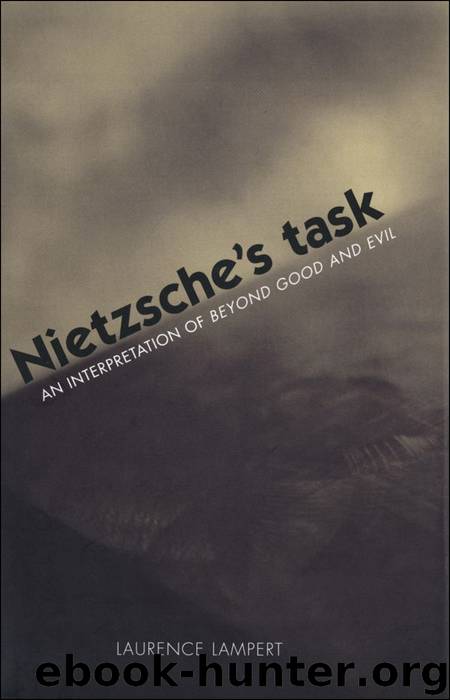Nietzsche's Task by Laurence Lampert

Author:Laurence Lampert
Language: eng
Format: epub
Publisher: Yale University Press
Published: 2001-01-12T16:00:00+00:00
Lying and Dreaming
SECTIONS 192–93
The two sections on the role of Socrates and Plato in the natural history of our morality lead to two sections on more general lessons learned from that science, arresting lessons about lying and dreaming that seem to reflect back on Socratism and Platonism.
Section 192 The science of the natural history of morality allows one to bring morality to a vast domain of human awareness where it has been lacking: “all ‘knowledge and cognition.”’ It can do so because this science, like the history of any science, provides a “clue for understanding the oldest and most common processes” of knowledge. In those processes, a “lack of mistrust” is present earliest when the senses are most directly under the influence of the affects; impressions formed under that lack of mistrust exercise continuing force, conditioning all later perception.13 The natural history of morality therefore counsels a new morality of mistrust in which mistrust is unnatural because the very senses have been naturally trusting and inventive instruments prone to transform everything perceived into the already familiar.14 Any novel view must contend with this natural conservatism built into the senses; it requires “more strength, more ‘morality’” than the views it contests.
13. The consequences of this lack of mistrust for mature rationality were well known to Descartes; see Discourse on the Method, Discourse 2, end of first paragraph.
14. The philosopher’s “duty to suspicion,” which civil life measures as imprudent and as a “sign of ‘bad character’” (34), thus receives an additional rationale from the history of morality. Graham Parkes inserts section 192 into his extended analysis of “The Fabric(ation) of Experience” as set out in Dawn of Day and in unpublished notes from 1881. The result is an illuminating account of Nietzsche’s view of “the contribution of phantasy to the constitution of experience” (Composing the Soul 30!, see 289–305).
The new morality of mistrust draws a general conclusion from its understanding of the inertial power of the familiar: “We are from the ground up, from time immemorial—accustomed to lying” This conclusion of the new morality may sound immoral, so Nietzsche restates it more virtuously: “One is much more an artist than one knows.” Such lying, such artistry, covers a far broader expanse than the conscious lying Socrates and Plato permitted themselves on behalf of the moral decency of the multitude. The morality of science, its subtlety, mistrust, and patience, brings morality to the received moralities whose lying, artful basis in all perception and cognition it comes to understand.
Section 193 The remnants of early sensations are not the only cognitions that help condition conscious experience: so too do dreams. What is experienced in habitual dreams, Nietzsche claims, “spoon feeds” the wakeful mind even in its brightest moments, giving it its sense of happiness and what to aspire to. This general claim is augmented by an example that elaborates it and helps make it persuasive: the dream experience of flying colors the waking sense of happiness or what is found fulfilling.15 Perhaps this example must
Download
This site does not store any files on its server. We only index and link to content provided by other sites. Please contact the content providers to delete copyright contents if any and email us, we'll remove relevant links or contents immediately.
The remains of the day by Kazuo Ishiguro(7562)
Tools of Titans by Timothy Ferriss(6955)
The Black Swan by Nassim Nicholas Taleb(6199)
Inner Engineering: A Yogi's Guide to Joy by Sadhguru(5903)
Giovanni's Room by James Baldwin(5888)
The Way of Zen by Alan W. Watts(5805)
The Six Wives Of Henry VIII (WOMEN IN HISTORY) by Fraser Antonia(4795)
The Power of Now: A Guide to Spiritual Enlightenment by Eckhart Tolle(4760)
Astrophysics for People in a Hurry by Neil DeGrasse Tyson(4625)
Asking the Right Questions: A Guide to Critical Thinking by M. Neil Browne & Stuart M. Keeley(4584)
12 Rules for Life by Jordan B. Peterson(3739)
The Ethical Slut by Janet W. Hardy(3506)
Skin in the Game by Nassim Nicholas Taleb(3473)
Housekeeping by Marilynne Robinson(3406)
The Art of Happiness by The Dalai Lama(3388)
Double Down (Diary of a Wimpy Kid Book 11) by Jeff Kinney(3280)
Skin in the Game: Hidden Asymmetries in Daily Life by Nassim Nicholas Taleb(3270)
Walking by Henry David Thoreau(3236)
12 Rules for Life: An Antidote to Chaos by Jordan B. Peterson(3206)
